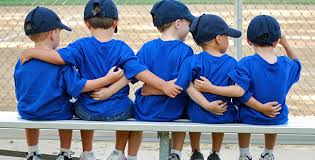Summer has arrived, school is out, and now kids can spend more time outside enjoying sports and games, whether at camp, at the local park or even  just in the backyard. The U.S. Military represents one of the strongest codes of honor in the world. Sports and competitions also have a code of honor. And we all know as parents, that good sportsmanship is important in almost every area of life. It’s never too early to start instilling good sportsmanship in our children – both boys and girls. And for teenagers, as they become active in high school sports, clubs, competition and politics, it is critical.
just in the backyard. The U.S. Military represents one of the strongest codes of honor in the world. Sports and competitions also have a code of honor. And we all know as parents, that good sportsmanship is important in almost every area of life. It’s never too early to start instilling good sportsmanship in our children – both boys and girls. And for teenagers, as they become active in high school sports, clubs, competition and politics, it is critical.
In today’s internet culture of instant gratification, it’s harder and harder for children to automatically understand the advantages of being both gracious about winning and  sportsmanship-like about losing. But in real life, good sportsmanship is a difference maker. It indicates strong character, a sense of balance and can make or break a career.
sportsmanship-like about losing. But in real life, good sportsmanship is a difference maker. It indicates strong character, a sense of balance and can make or break a career.
Today, US Family Health Plan – a TRICARE Health Program – wants to offer parents 6 important tips that can help instill the quality of good sportsmanship in your children and teens. And what better time to do it than this summer, when everyone is out playing?
Here are six keys we think are important that can help your children understand how to be a good sport:
- Encourage your child to congratulate their opponent when they lose and never rub a loss in.
- Remind your child not to boast when they win, but rather say thanks to the praise they receive.
- Talk about the game afterwards and help your child see specifically how they did well.
- Discuss the game and ask your child where they wish they could have been more effective to prepare for the next game.
- Encourage your child to do their best, but remind them we all have “off” days and that’s fine.
- Don’t be the negative parent at your child’s events — cheer on good playing on both sides and refrain from arguing with coaches and referees.
In general, make it a practice to recognize and reward good sportsmanship not only in athletic events but in everyday areas of their life. Give them a pat on the back when they share things with their siblings or help someone out in the community. Also, praise them for art work, musical endeavors, dance recitals, science competitions and other areas of achievement. And encourage them to encourage and support the worthy efforts and accomplishments of younger siblings and other neigborhood friends.
 Sportsmanship promotes positive growth in many areas of child and teen development. It helps them develop important traits, like the abilities to tolerate frustration, exhibit patience, learn from experience, and empathize with others who may be struggling. It teaches them to never give up and to feel okay when someone out-competes you. Most importantly, it will help your children understand that the most important challenge in life is to do your best, not to necessarily win. And it teaches them to help others do their best and perservere, as everyone works together as a team. All of these traits will pay in every important area of life, and they will pay off for a lifetime.
Sportsmanship promotes positive growth in many areas of child and teen development. It helps them develop important traits, like the abilities to tolerate frustration, exhibit patience, learn from experience, and empathize with others who may be struggling. It teaches them to never give up and to feel okay when someone out-competes you. Most importantly, it will help your children understand that the most important challenge in life is to do your best, not to necessarily win. And it teaches them to help others do their best and perservere, as everyone works together as a team. All of these traits will pay in every important area of life, and they will pay off for a lifetime.
As parents we can model good sportsmanship to our children by our example. We all have good days and bad days, but we can show our children by our actions how to tolerate  frustration, work though difficult situations, solve problems and show patience. Children identify with a calm attitude that allows us to stick to a task until it can be fully understood and solved, even if we have a few pitfalls along the way. The greatest achievers aren’t always the smartest, the most athletic, or the ones who have the greatest endowments — they’re people who persist, work hard, stick to the task, stay organized, have well-developed concentration and attention and are sportsman-like when others move a little faster.
frustration, work though difficult situations, solve problems and show patience. Children identify with a calm attitude that allows us to stick to a task until it can be fully understood and solved, even if we have a few pitfalls along the way. The greatest achievers aren’t always the smartest, the most athletic, or the ones who have the greatest endowments — they’re people who persist, work hard, stick to the task, stay organized, have well-developed concentration and attention and are sportsman-like when others move a little faster.
US Family Health Plan believes in promoting health and happiness for our members and their families, at every stage in life. Good sportsmanship, when taught early in life, can pay off a lifetime of dividends. The the ability to build and cultivate strong, positive relationships and live a well-balanced life are two of the most important ingredients for life success. It’s a gift that keeps on giving and one that cannot be shared at too young an age. And in true military form, it is the basis for an honorable life.

